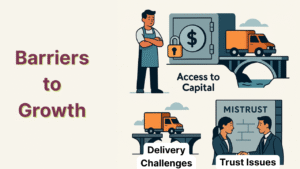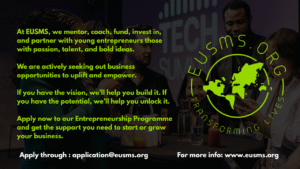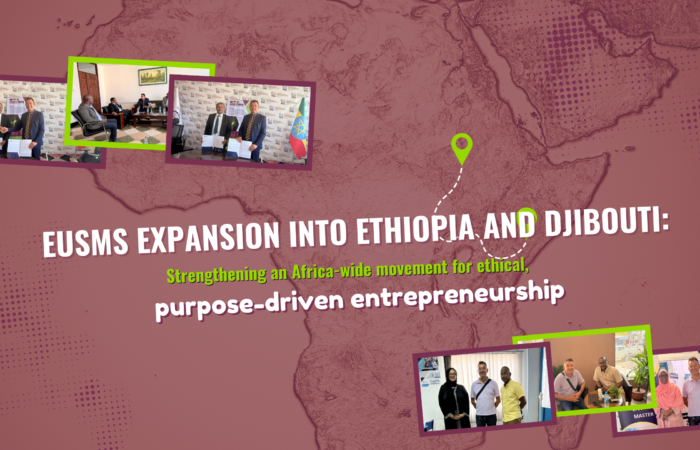The narrative of Africa is rapidly shifting from one of challenge to one of immense opportunity, driven significantly by its burgeoning youth population and the pervasive adoption of digital technologies. In East Africa, particularly Kenya, this transformation is most visible in the vibrant landscape of youth-owned, technology-enabled e-commerce startups. These aren’t just businesses; they are dynamic expressions of innovation, resilience, and a profound understanding of local market needs, leveraging the internet and mobile technology to bridge gaps, create value, and drive socio-economic change. This essay delves into the remarkable ascent of these youth-led e-commerce ventures in East Africa, highlighting their inherent strengths, the formidable challenges they navigate, and offering practical advice for the aspiring young entrepreneur poised to embark on this digital journey.
The Digital Tsunami: Paving the Way for E-commerce in East Africa

East Africa, a region characterized by its youthful demographic and rapid urbanization, has become a fertile ground for digital innovation. The widespread adoption of mobile technology, spearheaded by Kenya’s pioneering M-Pesa mobile money system, has fundamentally reshaped the economic landscape. This digital infrastructure has democratized access to financial services and, crucially, laid the groundwork for e-commerce. With increasing internet penetration, affordable smartphones, and a tech-savvy youth population, the barriers to entry for online businesses have significantly lowered.

Kenya, often dubbed “Silicon Savannah,” stands at the forefront of this digital revolution. Its robust mobile connectivity (with over 90% mobile penetration), a vibrant tech ecosystem of incubators and accelerators, and a government increasingly recognizing the digital economy’s potential, provide a unique environment for e-commerce to flourish.
The youth, comprising a significant majority of the population, are not merely consumers of this digital wave; they are its architects. Unburdened by traditional business models and inherently comfortable with technology, they are natural innovators. They spot market inefficiencies, identify unmet needs, and are quick to leverage digital platforms to offer solutions. This generation is characterized by its entrepreneurial spirit, a desire for self-employment, and a keen awareness of social issues, often weaving impact into their business models. Government initiatives, while still evolving, are beginning to play a supportive role, with programs aimed at digital literacy, youth empowerment funds, and the development of tech hubs. However, the true impetus often comes from the ground up, from young individuals transforming their digital literacy into tangible economic opportunities.
Inherent Strengths: Why Youth-Owned E-commerce Thrives
Youth-owned e-commerce startups in East Africa possess a distinct set of strengths that enable them to navigate complex markets and achieve remarkable success:

- Digital Native Advantage: This generation has grown up with the internet, smartphones, and social media. They possess an intuitive understanding of digital platforms, online consumer behavior, and effective digital marketing strategies. They are adept at leveraging social media for branding, customer engagement, and direct sales, often at minimal cost. This innate digital fluency allows them to build online storefronts, manage customer interactions, and process transactions with ease, bypassing traditional brick-and-mortar overheads.
- Agility and Innovation: Unlike larger, established businesses, youth-led startups are incredibly agile. They operate with lean teams, minimal bureaucracy, and a willingness to experiment. This allows them to pivot quickly in response to market feedback, adapt to changing consumer preferences, and rapidly integrate new technologies. Their innovative spirit often leads to disruptive business models that challenge conventional approaches, whether it’s optimizing last-mile delivery or creating hyper-niche marketplaces.
- Problem-Solving Focus and Local Relevance: Many young entrepreneurs start businesses to solve problems they directly experience or observe within their communities. This deep local insight allows them to identify genuine market gaps and develop highly relevant products or services. Their e-commerce solutions are often tailored to local tastes, cultural nuances, and logistical realities, giving them a competitive edge over generic, imported models. They understand the “pain points” of their fellow citizens and build solutions that truly matter.
- Cost-Effectiveness and Lean Operations: With limited capital, youth entrepreneurs are masters of lean operations. They leverage free or low-cost e-commerce platforms (like Shopify, WooCommerce, or even social media shops), utilize mobile money for transactions, and often manage logistics in-house or through informal networks. This ability to minimize overheads allows them to remain competitive on pricing and achieve profitability with smaller sales volumes, making their businesses more sustainable in resource-constrained environments.
- Strong Community and Network: Young entrepreneurs often benefit from robust peer networks, both online and offline. They connect through social media groups, university entrepreneurship clubs, and local tech hubs. These networks provide invaluable peer support, knowledge sharing, mentorship, and even early customer bases. This collaborative spirit fosters a sense of community, allowing them to overcome challenges collectively and tap into shared resources.
- Integrated Social Impact: Many youth-led e-commerce startups in East Africa are inherently driven by a desire to create positive social change. They often integrate social good into their core business models, whether it’s sourcing from local artisans, promoting eco-friendly products, or creating employment opportunities for marginalized groups. This focus on social value not only aligns with their personal values but also resonates strongly with conscious consumers, building brand loyalty and attracting impact investors.
Illuminating Examples: Kenyan Youth-Owned E-commerce Success Stories
Kenya’s e-commerce landscape is dotted with inspiring examples of youth-owned businesses that embody these strengths. While specific “youth-owned” details can be fluid and change rapidly in the startup world, here are archetypes and known examples that illustrate the trends:

- Online Fashion & Apparel Boutiques (e.g., Archetype: TrendyThreads Kenya):
- Business Model: Young designers or fashion enthusiasts create online stores (often on Instagram, then graduating to Shopify or custom sites) selling trendy, locally sourced, or custom-made apparel. They leverage influencers and user-generated content.
- Strengths:
Niche Market Focus: Many target specific demographics (e.g., modest fashion, streetwear, sustainable fashion) that larger retailers overlook.
Agile Inventory: Often operate on a pre-order or small-batch production model, reducing inventory risk.
Strong Visual Branding: Excellent use of social media for visual storytelling and direct customer engagement.
Example: While specific “youth-owned” data is hard to pinpoint publicly, many successful Kenyan fashion brands like Vivo Activewear (though now larger, started with an entrepreneurial spirit) and a multitude of smaller, Instagram-native brands are driven by young founders who master online sales and marketing.
- Fresh Produce & Grocery Delivery (e.g., Greens & Grains Delivery):
- Business Model: Young entrepreneurs connect local farmers directly with urban consumers through online platforms or WhatsApp groups, delivering fresh produce, often organic, directly to homes or offices.
- Strengths:
Solving a Local Problem: Addresses issues of food waste, access to fresh produce in urban areas, and fair pricing for farmers.
Community Trust: Builds strong relationships with both farmers and consumers, fostering trust.
Lean Logistics: Often starts with bicycle deliveries or small vans, scaling up as demand grows.
Example: Startups like Twiga Foods (though now a large B2B platform, its early days involved connecting farmers to vendors via tech) and numerous smaller, localized initiatives demonstrate this model. Many youth-led ventures operate on a smaller, direct-to-consumer scale.
- Artisanal Crafts & Handmade Goods (e.g., AfroCrafts Marketplace):
- Business Model: These platforms empower local artisans (often women or marginalized groups) by providing an online storefront to sell handmade jewelry, décor, textiles, and art to a wider, often international, audience.
- Strengths:
Social Impact at Core: Directly supports local economies, preserves traditional crafts, and provides sustainable livelihoods.
Global Reach: E-commerce enables access to international markets that would otherwise be inaccessible.
Authenticity & Storytelling: Leverages the unique stories behind each product and artisan for marketing.
Example: While Africa’s Talking (a broader tech platform) enables many such ventures, individual youth entrepreneurs are building their own niche platforms. Consider the numerous small businesses on Etsy or local equivalents that are run by young Kenyans showcasing their country’s rich artistic heritage.
- Tech Gadgets & Refurbished Electronics (e.g., TechBargains KE):
- Business Model: Young tech enthusiasts create online stores for selling affordable electronics, often refurbished smartphones, laptops, or locally assembled gadgets. They might also offer repair services.
- Strengths:
Addressing Affordability: Taps into the high demand for affordable tech in a price-sensitive market.
Trust in Quality: Builds reputation through transparent grading of refurbished items and reliable after-sales support.
Technical Expertise: Founders often have a deep understanding of the products they sell.
Example: While not exclusively youth-owned, companies like Badili Africa (refurbished smartphones) demonstrate the market opportunity that many young entrepreneurs are also tapping into on a smaller scale through social media and direct sales.
- Specialized Services & Online Tutoring (e.g., SkillUp Kenya):
- Business Model: Youth leverage their academic or professional skills to offer online services, such as tutoring, graphic design, content writing, or virtual assistance, connecting with clients through their own websites or freelance platforms.
- Strengths:
Low Startup Costs: Primarily requires internet access and skills, minimal physical inventory.
Flexibility: Offers flexible working hours, appealing to students or those balancing other commitments.
Scalability: Can serve clients globally, not limited by geographical boundaries.
Example: Many young graduates and students are creating their own online tutoring services or freelancing on platforms like Upwork and Fiverr, building their personal e-commerce brands.
Navigating the Digital Rapids: Challenges Faced by Youth-Owned E-commerce Startups
Despite their strengths, youth-owned e-commerce startups in East Africa face a unique set of challenges that can hinder their growth and sustainability:

- Access to Capital: This is perhaps the most significant hurdle. Young entrepreneurs often lack the collateral or credit history required by traditional banks. Angel investors and venture capital are scarce for early-stage, smaller ventures, especially outside the tech hub of Nairobi. This forces many to rely on personal savings, family loans, or microfinance, which limits their ability to scale, invest in marketing, or expand inventory.
- Logistics and Infrastructure: While improving, last-mile delivery remains a major challenge. Unreliable addressing systems, poor road infrastructure in rural areas, and high transportation costs can make efficient and affordable delivery difficult. Managing returns and ensuring timely fulfillment across diverse geographical areas adds complexity.
- Building Trust and Payment Security: Despite the prevalence of mobile money, building customer trust in online transactions, especially for larger purchases or new brands, can be challenging. Concerns about product quality, secure payment gateways, and reliable delivery can deter potential customers. Fraud and cybersecurity threats also pose risks that small startups may struggle to mitigate.
- Intense Competition: The e-commerce space is becoming increasingly crowded. Youth-owned startups face competition not only from established local players and international giants (like Jumia and Kilimall) but also from the vast informal sector and traditional brick-and-mortar stores. Differentiating themselves and capturing market share requires significant innovation and consistent effort.
Conclusion
Youth-owned, technology-enabled e-commerce startups in East Africa, particularly in Kenya, represent a powerful force for economic empowerment and social transformation. Fueled by a digitally native generation, these ventures leverage agility, local insights, and lean operations to create innovative solutions that resonate deeply within their communities. Their inherent strengths are undeniable, yet they navigate a challenging environment marked by limited access to capital, logistical hurdles, and the need to build trust in a nascent digital economy.
To truly unlock the full potential of this vibrant entrepreneurial ecosystem, concerted support from governments, non-profit organizations, and the broader private sector is critical. By providing accessible funding, streamlining regulations, enhancing digital infrastructure, and offering comprehensive mentorship and training, the region can foster an environment where these digital dreams can fully blossom into sustainable, impactful realities. The future of East Africa’s economy and social fabric rests significantly on the shoulders of these young innovators, and investing in their success is an investment in a brighter, more prosperous future for all.

Author : Hala Ahmed Maalla






